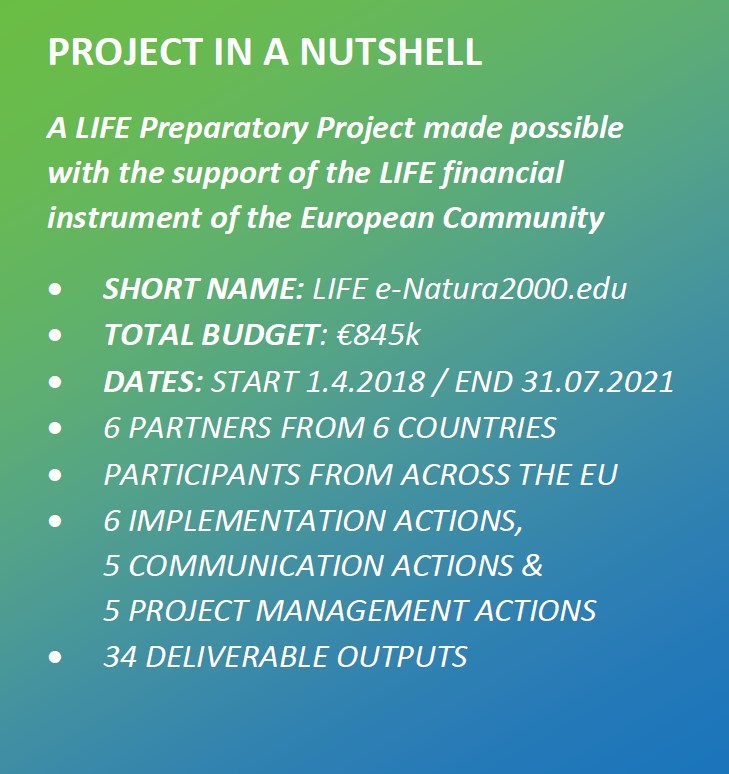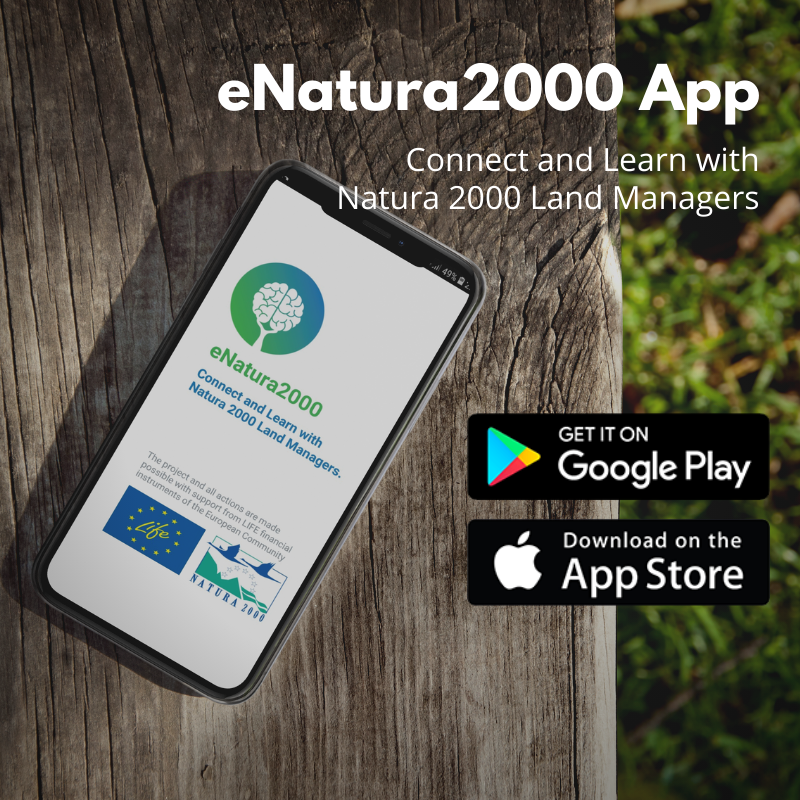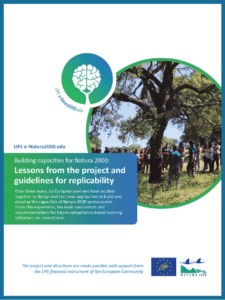LIFE e-Natura2000.edu: Lessons from the project and guidelines for replicability
For the past three years, six partners from across Europe have joined their forces on a LIFE Preparatory Project ‘LIFE e-Natura2000.edu’ in order to build and develop the capacities of Natura 2000 professionals. Their experiences and the results of their work and are now gathered in “Guidelines for replicability and recommendations for future capacity building”, a technical report which proposes useful solutions for future competence-based learning initiatives.
About the project
LIFE e-Natura2000.edu (or LIFE.edu for short) ran from April 2018 to July 2021. During that time, the project’s partners explored the potential of developing new approaches and integrating innovative learning methods to improve knowledge and capacity amongst Natura 2000 managers in both public and private land. The main aim of the project was to produce and test a flexible mix of blended learning tools and methods, designed to build and develop the capacity required for effective Natura 2000 management practices.
By taking a competence‐based approach, the project enabled peers to connect and learn about what managers need to know and be able to do to improve their practical management effectiveness. This approach has established a lasting legacy: the evaluated results will be used to develop replicable and up‐scalable capacity building actions well into the future.

Problems addressed
Recent studies have highlighted important gaps in terms of practical knowledge and capacity to implement Natura 2000 and the two underpinning legislations, the Birds and Habitats Directives. Several problems and knowledge gaps are common among all types of Protected Areas worldwide, while other capacity weaknesses are specific to the characteristics of Natura 2000. In particular, in relation to Natura 2000 management, the 2016 Fitness Check reported that there is limited expertise, insufficient staff resources and inconsistent standards in relation to the specific environmental procedures and quality of impact assessments required under the Directives.
Project results
Across the full range of implementation, communication and management actions, the project has achieved significant results which include:
- Identifying specific core functions and capacity development needs for all Natura 2000 managers;
- Developing a new Natura 2000 online Training Needs Analysis tool to identify individual competencies and capacity building professional development needs for Natura 2000 managers;
- Delivery of three core courses in three different languages, designed to provide competence-based learning in areas identified as being specifically required by Natura 2000 managers;
- Design and delivery of a virtual summer school;
- Development of an App for Natura 2000 managers and stakeholders of Natura 2000 management.
- Participation in a wide range of networking events to present the project and share capacity building experiences with diverse actors at national, (biogeographical) regional and international levels.
- Comprehensive progress monitoring, administration and management reporting systems developed and applied by the project partners.
The Training Needs Assessment tool
The Training Needs Assessment (TNA) tool was designed to help individual Natura 2000 managers and other staff members of various entities that have Natura 2000 management responsibilities to assess their competencies and learn about their priority capacity development needs.
By using the tool, all Natura 2000 managers could self-assess their training needs and use the results to plan their future professional development actions.
Based on the results from testing, the project partners have shown that the LIFE.edu online TNA tool has a lot of potentials to help European and national institutions in developing capacity building plans and coherent programmes for Natura 2000 managers operating at all levels.
Delivering the courses
Life.edu delivered three courses, which constitute a core component of the whole project
- Course I, Applied Conservation Biology, led by Propark and addressed mainly to Romanian Natura 2000 managers (in Romanian).
- Course II, Building Alliances for Natura 2000 Management, led by FUNGOBE and addressed mainly to Spanish Natura 2000 managers (in Spanish).
- Course III, Competent Inclusive Communication, led by EUROPARC and pan European in its scope (in English).
Online or face-to-face?
The impact of COVID-19 restrictions made clear that flexible and mixed strategies are required to overcome unexpected factors that can occur when planning and delivering capacity building courses in a variety of settings. Most of the activities that had been initially planned as face-to-face events were redesigned and transformed into online formats.
Despite the Covid-19 outbreak, the pace of delivery of tasks and activities was fine for 86% of participants.
Smartphone App
The project’s new ‘eNatura2000’ App was conceived as one of the high potential learning and networking tools to be designed and delivered during the project.

eNatura2000 App
The app is available on Google Play and App Store! DOWNLOAD IT NOW!
Apart from networking, the app offers a wealth of resources on Natura 2000 management. Find out more about the LIFE Programme, discover communication strategies that you can apply when working with stakeholders, or more information about the LIFE e-Natura2000.edu project. Additionally, every week new articles are published with interesting information in the field of nature conservation and management.
Summer school
The summer school ‘Natura 2000 management in practice’ lead by the University of Padova’s project partner TESAF was designed to address several technical management issues in more depth.
Due to the pandemic, the LIFE.edu ‘Virtual Summer School’ programme used new materials, such as virtual field trips (demonstration videos) about the application of specific management approaches (e.g. for setting conservation objectives or reference values) and case studies. This created the opportunity to test how typically face-to-face taught topics can be presented online in a digital setting, again by means of a dedicated Moodle.
Partners’ knowledge gains
As part of the project’s reflection and evaluation processes, all partners identified the following main impacts:
- The identification of competencies needed for the management of Natura 2000 sites and to provide a very practical training needs assessment tool for Natura 2000 managers.
- The demonstration of the need for and value of competence-based learning opportunities for Natura 2000 professionals through innovative learning methods and formats
- The development and testing of new tools for online learning that would improve and increase capacity building opportunities
Other important impacts cited by the partners are:
- The creation of momentum for and demonstration of the value of a larger scale follow-up project.
- The strengthened link between academy and professionals
- The extension of partners networks (within partners and with participants in the different activities)
- Increased knowledge regarding Natura 2000 and its challenges among all stakeholders (partners, participants, landowners, etc.)
What worked well?
- Project’s coordination and partner’s cooperation.
- The adaptability, flexibility, and problem-solving creativity of project partners in responding to the COVID-19 situation.
- The inclusive approach to recruitment of project participants for the core groups, represented in terms of diversity of professional backgrounds and experience levels, national and regional locations, types of organisations (public and private, GO and NGO), gender and age.
- The participatory development of the list of Natura 2000 competencies with the project partners.
- Flexible design and delivery of the courses
- Participants’ active involvement and personal commitment whilst dealing with COVID-19 changes in their professional and personal lives.
- Development of the first App on Natura 2000 with all the planned parts and favourable reviews.
If you would like to get more detailed insight and guidance through all stages and milestones of the LIFE.edu project, download the full report here:
Conclusions and recommendations
The main conclusion of the project is that it has evidenced the need opportunity and merits of developing dedicated capacity building programmes tailored for Natura 2000 managers. These programmes need to be designed to support the achievement of EU priorities for nature management.
As a direct outcome of LIFE.edu, the value of creating continuous professional development programmes for nature managers, directly linked to EU priorities and that actually meet learning needs, is beyond question.
Download the full PDF version of the document here: Guidelines for replicability and recommendations for future capacity building
and the summary version here: LIFEedu Summary Replicability Guidelines
